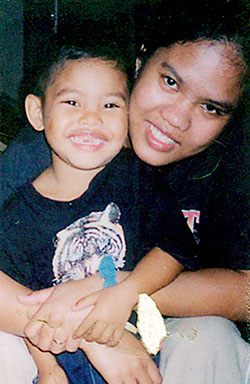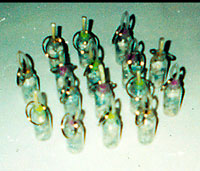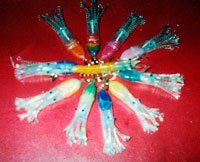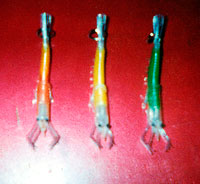'Fish': God doesn't give us trials we couldn't handle

Lenny and son
People in some hospitals call Lenny Badaguas as "fish" or "isda." Her sons McAllen, 7 and Iverson, 6, call her Mama Fish. Her husband Andrew also joins in the endearment.
The following is the story behind "Fish."
In 2002, Andrew got hit by a car and the driver promised he will take care of the hospital expenses. But, after reneging on his promise Andrew stayed at the hospital for three years because they were unable to pay their hospital bill, which reached P465,000.
Unable to work because he has to stay in the hospital, Andrew's wife Lenny worked as a dishwasher to the hotel where he worked. "I had to work so that I could feed our two kids. One of our kids was left with our neighbor and one was with my mother. But after a while, the work had taken its toll on me and I also got sick," Lenny said.
In the Badaguases' case, boredom and the need to survive turned out such blessings. Andrew decided to keep himself busy by creating a fish out of the dextrose tubes that they used. Quite enjoying what they were doing, they collected the said stuff from the hospital and created as many as they can. After the tubes came the regulator. "That's the one being used to regulate the flow of water. We thought of turning that into a shrimp," Lenny said. This came about after a student asked if they could make shrimp keychains and she would order 50 pieces. "Andrew used the shrimp in the Oishi cracker packaging as his inspiration," she said.

Money Bottles
Later on, they made squid keychains, too. "Andrew took inspiration from the squid in the Lala package," Lenny said laughing.
The experimentations did not stop there. Lenny thought that it would be nice to put different colors on what they did. So, they experimented on crayons and wax and that was a success. Soon, they came up with keychains out of the fishes, shrimps and squids and sold them to the nurses, doctors and students at the said hospital. During medical missions, some people would see the keychains being brought by the doctors and they would start asking where they could buy such. More orders for the fish and shrimp keychains came in.
Andrew discovered about the money bottle, believed to bring good luck. So, Lenny collected small medicine vials and they placed paper money inside it. They decorated the bottles with beads and also turned them into keychains.

Fish keychains
According to Lenny, some of their purchasers are selling the keychains in Boracay, Manila, Italy, Hongkong, Saudi Arabia and the United States.
Eventually, the couple came out of the hospital after entering into an agreement with the management that they will pay P500 a month for 40 years.
"Before we entered the hospital, we really had no idea on making keychains. But the desire to survive and the fact that we had nothing to do, stimulated our creativity to make these products," Lenny said.
"I was so young then, at 19 and my husband was 32. I didn't know much then. That experience made me more mature," she said.

Squid keychains
She narrated that she keeps a diary of their stay in the hospital. "I always cry when I read certain parts of that diary. One time, I wanted to jump off from the hospital. Then I went to the chapel and my strength was renewed. I told myself that it was just a trial and that we could surpass it. I knew God would help us. He won't give us trials that we couldn't handle."
"When I see the hospital, I tell myself, 'That was our house before,'" she added.
Now, the Badaguas couple is also making hospital scrubs and curtains. "My husband sews them. Despite the steel that's on his leg, he's determined."

Shrimp keychains
The couple plans to expand even more so they could pay off their hospital debt and let their children finish school. McAllen and Iverson are now studying at the Calaparan Elementary School.
They call their business as MIB Recycled Products, the initials of their two kids.
(The Badaguas couple can be reached through 0915-4684-233)
